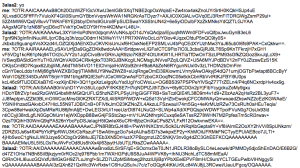
“[W]e must never allow the future to collapse under the burden of memory.” – Milan Kundera, The Book of Laughter and Forgetting
Rare is the interview that brings tears to my eyes. This is not what I was expecting when I sat down for an interview with my friend, the journalist Lina Attalah, in Cebu City, Philippines, a couple of weeks ago. She had told me about the interview the evening before over snacks and drinks at our hotel’s rooftop bar and I, always a fan, had eagerly agreed. We were to talk about surveillance, the Internet, infrastructure.
Memory is a tricky thing. Over the past few years, I’ve been asked for “my story” many times. How did I come to what I do? Why the Middle East? And every time, I tell it differently. The anecdote about the Moroccan professor who was a harsh and hated teacher but when he talked about his homeland, his eyes lit up. How I skipped my own graduation to study Arabic the summer after because I couldn’t be arsed to get up at 8am during the school week. The first time Global Voices linked to my blog. The bloggers I met, knew, remember.
Memory is a tricky thing. I can tell that story plainly, or I can tell it through revelations I had later on, after I’d made the choice, after I sat on my kitchen counter that first day, peeling potatoes and wondering what had led me there. I can also tell the story of how I came to politics, to political thinking, but sadly, there are pieces missing, pieces of my own memory, pieces I can never retrieve.
I don’t remember who taught me how to use OTR, but I remember one of its biggest advocates. Alaa, a friend I met first in 2008 and who is now imprisoned in Cairo, was among a few friends who, early on, pushed me to use encryption. When I finally adopted it, our conversations opened up – not just with Alaa but with a number of people whose use of OTR—a way of holding ephemeral, encrypted chats that disappear when the window closes—made them feel safe. And it made me feel safe too: Not just from the watchful eyes of governments, but from those who might log, share, later embarrass me with my own naiveté.
Last April, in some other city, I sat with Lina on a bus, telling her about my sadness in conversations lost to OTR. During our interview, she brought that line of thinking back, asking me “Is the proliferation of a consciousness of privacy canceling out important narrative, important information?” She continued:
You mentioned to me once having had long encrypted chats with an activist over the years and now you have no access to these. That’s a record dropped. But there is an additional layer, which is that not only people use encryption but they actually end up not saying stuff altogether. The unsaid can be the product of privacy…
A record dropped. The unsaid as a product of privacy. Confronted with this idea, and the memories of conversations I will never recall, I found my eyes suddenly welling up with tears. Tears for the things I’ve learned, and all the things I’ve forgotten.
Ephemerality is a funny thing. Often, it frees us from the burden of memory; memory that can come back to haunt us. Unlike PGP, wherein encrypted emails are still store-able and unlockable with a private key, OTR erases our memories, allows our gabbing to be ephemera. This serves a purpose, but its unintended consequences, for me at least, often feel severe. I think back to when I first adopted the tool and wonder: Did I realize?
Becoming conscious of our privacy is a good thing. Consciousness is always a good thing. But as we become more conscious of the weight of our secrets, our hidden lives, are we forgetting the value of the archive?